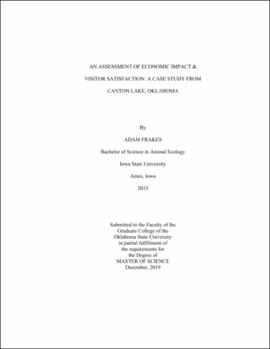| dc.contributor.advisor | Joshi, Omkar | |
| dc.contributor.author | Frakes, Adam | |
| dc.date.accessioned | 2020-06-03T19:04:43Z | |
| dc.date.available | 2020-06-03T19:04:43Z | |
| dc.date.issued | 2019-12 | |
| dc.identifier.uri | https://hdl.handle.net/11244/324822 | |
| dc.description.abstract | Lake resources provide a variety of socioeconomic benefits ranging from market based goods (e.g., water supply and irrigation) to non-market based ecosystem services (e.g., recreation, wildlife habitat). However, ecosystem services are difficult to quantify and their benefits have been largely overlooked during natural resource decision making. In Oklahoma, debates over water allocation for alternative uses followed water releases from Canton Lake during the 2010-2013 drought. While water rights at Canton Lake rest with Oklahoma City, the lake remains a popular recreation destination in the region suggesting significant social and economic values for its recreational use. In an effort to provide managers and policy makers with a more holistic picture of the human dimensions at Canton Lake, survey data — collected from Canton Lake visitors during 2018 and 2019 — were used to evaluate visitor satisfaction as well as the economic impacts of visitor spending. Ordinal logistic regression, based in random utility theory, was utilized to evaluate which factors contributed to visitor satisfaction whereas input-output models — developed in IMpact Analysis for PLANning (IMPLAN) software — were used to estimate the effects of visitor spending on the three-county region and state. The results suggest that some, but not all, expressive and instrumental attributes were good predictors of overall satisfaction. Lake accessibility and fishing quality, which are particularly vulnerable to low water levels, may contribute to a decline in lake visitation. Economic data further suggests that resident and nonresident visitors contribute significantly to the regional economy, particularly in the retail and accommodation and food services sectors. However, nonresidents account for over half of all visitor spending meaning that reduced visitation could lead to a substantial loss in economic activity for the three-county region and, to a lesser extent, state. Altogether these results indicate that future withdrawals from Canton Lake under current policy are likely to have significant negative social and economic effects. | |
| dc.format | application/pdf | |
| dc.language | en_US | |
| dc.rights | Copyright is held by the author who has granted the Oklahoma State University Library the non-exclusive right to share this material in its institutional repository. Contact Digital Library Services at lib-dls@okstate.edu or 405-744-9161 for the permission policy on the use, reproduction or distribution of this material. | |
| dc.title | Assessment of economic impact and visitor satisfaction: A case study from Canton Lake, Oklahoma | |
| dc.contributor.committeeMember | Poudyal, Neelam | |
| dc.contributor.committeeMember | Long, James | |
| osu.filename | Frakes_okstate_0664M_16529.pdf | |
| osu.accesstype | Open Access | |
| dc.type.genre | Thesis | |
| dc.type.material | Text | |
| dc.subject.keywords | canton lake | |
| dc.subject.keywords | economic impact | |
| dc.subject.keywords | human dimensions | |
| dc.subject.keywords | oklahoma | |
| dc.subject.keywords | recreation | |
| dc.subject.keywords | water conflict | |
| thesis.degree.discipline | Natural Resource Ecology and Management | |
| thesis.degree.grantor | Oklahoma State University | |
